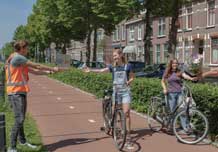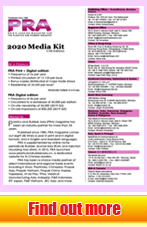Paving the roads with waste plastics
Recycling waste plastics by downscaling for road construction is a cheaper and more effective technology that wants for wider adoption, says Angelica Buan in this report.
Recycling: how much is enough?
Are we recycling enough plastics? Based on a 2017 published study, by authors Roland Geyer, Jenna Jambeck and Kara Lavender Law, as of 2015, only 9% of the 6,300 tonnes plastic waste generated has been recycled. Meanwhi le, 12% was incinerated and 79% was accumulated in landfills or the natural environment.
By 2050, the volume of plastic wastes in landfills would have nearly doubled at 12,000 tonnes if current recycling trends continues, the authors forecast.
In shor t , we are not recycl ing enough and i f recycling is done at all, whether it is effective even at the local level. For the most part, waste plastics are incinerated, dumped onto landfills, with some ending up in oceans, or shipped to countries that lack proper recycling infrastructure.
On the other hand, some experts contend that recycl ing is not the ultimate solut ion to stop the deluge of waste plastics. Geyer and co-authors of the above study observed that recycling “only delays, rather than avoids final disposal (of plastics)”.

And this is considering that the majority of recyclable plastics at final disposal can only be recycled up to two times, according to according to Hannah Ritchie and Max Roser in a 2018 report published in Our World in Data.
It is, thus, not surprising that the recycling rate cannot offset the increasing production rate of plastics. International non-profit organisation Plastic Oceans estimates the global plastic production at 300 million tonnes/year, half of which is for single-use or disposable purposes.
Nonetheless, recycling offers a huge market potential, based on a report by Transparency Market Research, which says recycling could potentially hustle US$60 billion by 2027 nearly doubling in value from US$34 billion in 2018.
Building up plastics use in packaging and construction
Historically, two sectors, packaging and infrastructure (building & construction) consume the largest amount of plastics. US-headquartered market consultancy Smithers projected the plastic consumption of packaging at 69.8 million tonnes by 2024, growing at a CAGR of 3.5% from 58.6 million tonnes in 2019.
Building and construction, meanwhile, utilised nearly 55 million tonnes of plastics in 2016, according to Germany-headquartered market research group Ceresana. Plastics in building are used mainly for films, cables, pipes, profiles and covers, sheets, fastening components, glazing, coatings, and membranes.
The increasing construction activities boost applications for plastics and by 2024, the global construction plastics market is forecast to exceed US$106 billion, growing at a CAGR of 6.9%, according to a report by AMA Research.
Preference for plastics in construction application is due to the materials’ thermal conductivity, insulation, durability and long life span; scratch and corrosion resistance, versatility, flexibility and cost-effectiveness, among other beneficial properties.
Recycling plastics by downcycling them show promise to alleviate the world from its solid waste burden. Downcycling, also called cascading, is the process of conver t ing discarded plastics like water bottles , shopping bags, wrappers, sachets and the like, into new products of lesser quality – in the case of road building – in the asphalt mix.

Waste plastics take the high road
The world needs more roads as economies expand, development surges, and population increases. The World Bank estimates a total US$34 trillion of road investments required to achieve the global sustainable development goals (SDG) agenda adopted by al l UN-member countries. To date, total infrastructure investments are at US$26 million, thus, leaving an US$8 million investments gap.
The need for more roads has opened up an avenue for waste plastics to be put in good use, by mixing them up in asphalt and with traditional road building materials (sand, stone, gravel, cement).
The PlasticRoad project, a collaboration between road construction specialist KWS, drainage and water plastic pipes maker Wavin and French oil and gas group Total, claims as the world’s first plastic road. The 30-m long pilot plastic road opened in Zwolle, the Netherlands, in September 2018, and consists of recycled plastics equivalent to more than 218,000 plastic cups.
According to the partners, the PlasticRoad will “allow for roads to be built faster with less impact on the sur roundings and less CO2 emissions. The improved drainage will also help to build resilience against heavy rain fall and reduce flooding”. The Zwolle bike path is equipped with sensors to track the road’s performance, including temperature, durability and the number of bike passages.

Utilising waste plastics for road building is, however, not a novel concept. In early 2000, Professor Rajagopalan Vasudevan, an Indian scientist from the Thiagarajar Engineering College, Madurai, broached the “frugal technology” concept of modified bitumen with waste plastics. In 2002, he paved a 60-ft road within the Madurai campus with the plastic bitumen mix in ratio of 5g of plastics per 50g bitumen. He has since paved 5,000 km of plastic roads in 11 states across India.
Vesudevan, who contends that banning plastics has adverse impact on the low income sectors, explains the process of plastic modified bitumen as easy and that requires no complex machines. The plastic wastes are shredded into as small as 2 mm pieces and the shredded plastic is added into the hot aggregate, which is thereafter blended into the bitumen. The plastic coats the stones in a thin film, resulting in good binding.
The method, aside from helping to stem the amount of plastic waste in India, estimated at 62 million tonnes/year, wi th only 24% of which is recycled, according to data from the UNDP (United Nations Development Programme)” SGP, has also helped generate jobs for the count ry’s informal recycling workers, such as the waste or rag pickers. Moreover, Vesudevan said that the plastic-modified bitumen improves road strength and reduces road fatigue.
Read more...
(PRA) Subscribe to Get the Latest Updates from PRA Please click here
©2020 Plastics and Rubber Asia. All rights reserved.

©2020 Plastics and Rubber Asia. All rights reserved.
Home Terms & Conditions Privacy Policy Webmail Site Map About Us



















